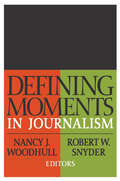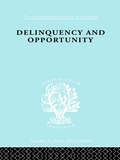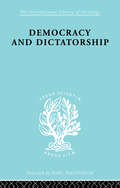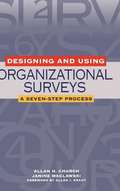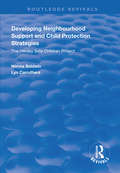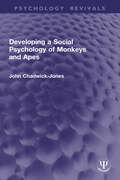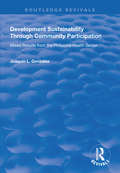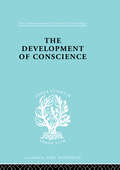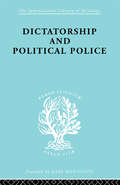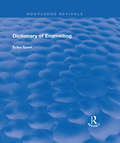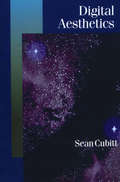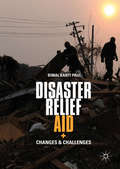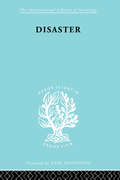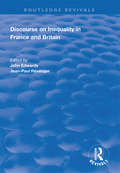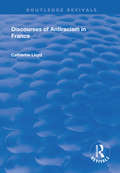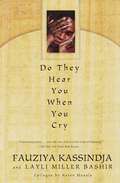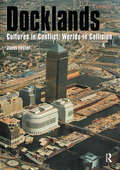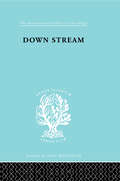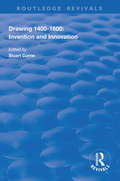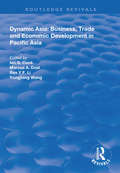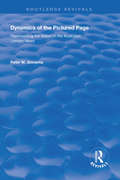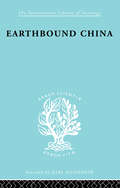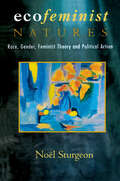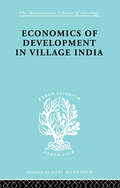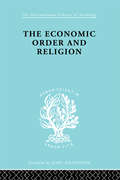- Table View
- List View
Defining Moments in Journalism
by Robert W. Snyder Nancy J. WoodhullMost great transformations are not apparent as we live through them. Only in hindsight do individual moments acquire layers of meaning that give them great significance. Looking back is not something that comes naturally to journalists, immersed as they are in breaking events and relentless deadlines. But there is still good reason for journalists, scholars, and people who care about journalism to think about the critical episodes in its recent evolution. In Defining Moments in Journalism, such authors vividly describe episodes of this kind. Some of the chapters and contributors include: "The Lessons of Little Rock" by Harry S. Ashmore; "Vietnam and War Reporting" by Peter Arnett; "Photo-journalists--Visionaries Who Have Changed Our Vision" by Jane M. Rosett; "The Weight of Watergate" by Ellen Hume; "Women Sportswriters--Business as Usual" by Mary Schmitt; "The Connie Chung Phenomenon" by Somini Sengupta; and "Covering Politics--Is There a Female Difference?" by Judy Woodruff. The years since the Great Depression and World War II have seen vast changes in America and also in its journalism. Journalists' relationship to power and authority is more complex; the press corps has become more diverse; the technology of news reporting is almost unrecognizably different from that of fifty years ago; and economic reorganization of the media has bundled news and entertainment organizations into conglomerates of extraordinary size. 'Defining Moments in Journalism' is a fascinating read for communications scholars and professionals, historians, and political scientists.
Delinquency and Opportunity: A Study of Delinquent Gangs (International Library of Sociology)
by Richard A. Cloward L.E. OhlinFirst published in 1998. Routledge is an imprint of Taylor & Francis, an informa company.
Democracy and Dictatorship: Their Psychology and Patterns (International Library of Sociology)
by Zevedei BarbuFirst published in 1998. Routledge is an imprint of Taylor & Francis, an informa company.
Designing and Using Organizational Surveys
by Allan H. Church Janine WaclawskiThis book will serve as an excellent primer for executives and practitioners who are about to embark on an organizational survey
Developing Neighbourhood Support and Child Protection Strategies: The Henley Safe Children Project (Routledge Revivals)
by Norma Baldwin Lyn CarruthersPublished in 1998, the book provides a useful contribution to current debates on social exclusion, the regeneration of communities and the refocusing of crisis driven child protection services to family support and the prevention of harm. It stresses the need for interagency strategies of: - neighbourhood and family support - action with young people for a safer environment - principles of partnership with communities - positive action to build on the strengths of families and communities, drawing on their own resources and expertise The detailed account of work to develop such strategies in one neighbourhood will be of value to policy makers, managers and practitioners. The book gives an overview of conditions associated with harm and abuse of children and approaches which can be successful in preventing harm. It documents experience and views of parents - mainly mothers - attempting to bring up their children in health and safety in a severely disadvantaged area. It argues for practical recognition of the links between disadvantage and individual harm, and the need for community development approaches to improve the life chances of children and families.
Developing a Social Psychology of Monkeys and Apes (Psychology Revivals)
by John Chadwick-JonesOriginally published in 1998, the aim of Developing a Social Psychology of Monkeys and Apes was to draw attention to the exciting progress of studies of the social psychology of monkeys and apes happening at the time. It is written with a clear style which should invite interest from a wide range of social scientists. The relatedness of humans and non-human primates that was usually considered in its genetic forms is followed through into the complex social tactics of monkeys and apes. The focus of the book was on the latest research as it had developed out of earlier classic studies. The wave of researchers working on social topics at the time is especially emphasized.This book will be of particular interest to primatologists, ethologists, anthropologists, zoologists, social psychologists, and students of social cognition and social interaction. For students, the appendices provide useful information on the variety of social structures of Old World and New World monkeys and apes.
Development Sustainability Through Community Participation: Mixed Results from the Philippine Health Sector (Routledge Revivals)
by Joaquin L. GonzalezPublished in 1998, this is a very timely book, especially with the current global concern for sustaining socio-economic development projects through increased civil society participation. The author warns development practitioners and scholars to be careful about over prescribing community participation as a panacea to achieving project sustainability.
Developmnt Conscience Ils 242 (International Library of Sociology)
by Geoffrey M StephensonFirst Published in 1998. Routledge is an imprint of Taylor & Francis, an informa company.
Dictatorship and Political Police: The Technique of Control by Fear (International Library of Sociology)
by E.K. BramstedtFirst Published in 1998. Routledge is an imprint of Taylor & Francis, an informa company.
Dictionary of Enamelling: History and Techniques (Routledge Revivals)
by Erika SpeelFirst Published in 1998 , The Dictionary of Enamelling is the first book to provide a comprehensive guide to this most diverse of the decorative arts.Indispensable for anyone interested in the evolution of enamelling technique, the book includes some 400 entries covering every aspect of its history. There are entries on key pieces, individual enamellers, designers, schools, techniques, and the major achievements are described in every era. The knowledge and insight of Erika Speel’s account are supported and enhanced by a brilliantly researched collection of 200 illustrations, 100 in colour, portraying the most dazzling and important pieces, a unique visual record of enamelling history. The Dictionary of Enamelling will be invaluable to people who collect, study, create and enjoy enamels.
Digital Aesthetics (Published in association with Theory, Culture & Society)
by Sean CubittThis book investigates the aesthetic nature and purpose of computer culture in the contemporary world. It casts a cool eye on the claims of cybertopians, tracing the globalization of the new medium and enquiring into its effects on subjectivity and sociality. Drawing on historical scholarship, philosophical aesthetics, and the literature of cyberculture, the author argues for a genuine democracy beyond the limitations of the free market and the global corporation. Digital arts are identified as having a vital part to play in this process. Written in a balanced and penetrating style, the book both conveniently summarizes a huge literature and sets a new agenda for research and theory. Copyright © Libri GmbH. All rights reserved.
Disaster Relief Aid: Changes And Challenges
by Bimal Kanti PaulDisaster Relief Aid: Changes and Challenges provides a comprehensive analysis of disaster relief efforts undertaken globally during the last several decades, and examines the changes and challenges that have emerged over time. The book evaluates the current state of disaster relief and discusses how it may be improved. The author examines salient features of disaster relief operations and provides an overview of the development of global humanitarian assistance programs. The book also explores how disaster aid is channelled from non-affected areas to affected areas. Using five major natural and man-made disasters as case studies, the book analyses the nature and extent of emergency relief efforts undertaken for each. The final chapter covers the post-disaster convergence phenomenon; outlines the major challenges of international disaster relief operation and finally, posits recommendations on how to improve future disaster relief efforts. This is an essential interdisciplinary text on disaster response for both undergraduate and graduate students as well as an invaluable resource for disaster researchers, managers, and numerous international and national non-governmental organizations (NGOs) and international agencies.
Disaster: A Psychological Essay (International Library of Sociology)
by Martha WolfensteinFirst Published in 1998. Routledge is an imprint of Taylor & Francis, an informa company.
Discourse on Inequality in France and Britain (Routledge Revivals)
by John Edwards Jean-Paul RévaugerPublished in 1998, this volume consists of 16 edited papers presented at an Anglo-French conference on inequality in France in March 1997. The purpose of this book is to bring together ideas and perceptions of inequality in the two countries across several areas including multi-ethnicity, education, social work, housing and health, presented by experts in these fields and in cultural studies. The purpose is not comparative in the traditional sense, but rather to analyze the different meanings amd conceptions that apply to inequality in France and Britain and to demostrate how these differences affect policies as well as what is considered to be legitimate grounds for policy intervention. This approach to social policy in Europe pays attention to the cultural meanings of concepts like inequality and demonstrates that comparative social policy can only be properly productive when it acknowledges that key words like poverty, inequality, citizenship, social rights and insertion/exclusion carry with them quite different ideological, moral and social meanings in two countries such as Britain and France.
Discourses of Antiracism in France (Routledge Revivals)
by Catherine LloydFirst published in 1998, this book is an examination of antiracist discourses and practices in France. It sets out to trace the development of post-war French antiracism through the life of antiracist organizations, setting this within a broader historical, political and social context. It breaks new ground in that it analyses antiracism as a body of ideas in its own right, rather than as a mirror image of racism. The author uses previously unpublished archival material from French organizations combined with observations from current events. She argues that antiracist discourses and practices are structured around four main themes: discrimination, representation, solidarity and hegemony. While perceptions of discrimination have evolved into complex understandings of social exclusion, the representational functions of antiracist groups were challenged by immigrant workers movements themselves. Solidarity remained central to antiracist practices in different political contexts. Underpinning these features lies a hegemonic social project through which antiracists have sought to promote a 'common sense' through political and educational campaigns. The author concludes that French antiracism although constantly changing and refocusing is now a pluralist, transversal, hegemonic movement and an important component of civil society.
Do They Hear You When You Cry
by Fauziya Kassindja Layli Miller BashirFor Fauziya Kassindja, an idyllic childhood in Togo, West Africa, sheltered from the tribal practices of polygamy and genital mutilation, ended with her beloved father's sudden death Forced into an arranged marriage at age seventeen, Fauziya was told to prepare for kakia, the ritual also known as female genital mutilation It is a ritual no woman can refuse But Fauziya dared to try This is her story--told in her own words--of fleeing Africa just hours before the ritual kakia was to take place, of seeking asylum in America only to be locked up in U. S prisons, and of meeting Layli Miller Bashir, a law student who became Fauziya's friend and advocate during her horrifying sixteen months behind bars Layli enlisted help from Karen Musalo, an expert in refugee law and acting director of the American University International Human Rights Clinic In addition to devoting her own considerable efforts to the case, Musalo assembled a team to fight with her on Fauziya's behalf Ultimately, in a landmark decision in immigration history, Fauziya Kassindja was granted asylum on June 13, 1996 Do They Hear You When You Cry is her unforgettable chronicle of triumph.
Docklands: Urban Change And Conflict In A Community In Transition
by Janet FosterThis text is a sociological study of a community in transition and the impact of urban regeneration. The process of change on the Isle of Dogs is revealed from the differing perspectives of Islanders, developers and business, and yuppies attracted to the area. The book is intended for undergraduate and postgraduate courses in urban sociology, social geography, cultural and community studies, housing and urban planning, race and ethnic studies, and broader market including Open University courses, "A"-level courses and general interest.
Down Stream Ils 216: Failure in the Grammar School (International Library of Sociology)
by R. R. Dale S. GriffithFirst Published in 1998. Routledge is an imprint of Taylor & Francis, an informa company.
Drawing, 1400-1600: Invention and Innovation (Routledge Revivals)
by Stuart CurrieFirst published in 1998, this volume twelve scholars explore ways in which drawings were employed and appreciated in various European Cities form late medieval times, through the Renaissance and Reformation periods and into the early seventeenth century. The essayists examine the relationship between preparatory sketches and finished artworks in more durable and expensive materials, and consider the roles played by various drawing types, such as studies from different kinds of model and student copies from a master’s exemplar. They also investigate how drawings and their mechanically- reproduced equivalents- engravings, etchings and other forms of print – came to be collected for both practical and connoisseurial purposes, and how iconographical and stylistic inventiveness were linked to imaginative artistic interpretations of traditional subjects and to technical innovations in drawing and printmaking. Through diverse approaches to the study of artists’ attitudes and ambitions, the essays in Drawing 1400-1600 offer ways of appreciating the complex and fascinating history of the practice and theory of drawing over two centuries during which the expressive potential of the medium was realized in some of the greatest artistic statements of all time.
Dynamic Asia: Business, Trade and Economic Development in Pacific Asia (Routledge Revivals)
by Marcus A. Doel Ian G. Cook Rex Y.F. Li Yongjiang WangPublished in 1998, this book examines the challenges and opportunities for international business and trade in the Asia-Pacific region, highlighting the dynamic and complexities of the region.
Dynamics of the Pictured Page: Representing the Nation in the "Illustrated London News" (Routledge Revivals)
by Peter W. SinnemaOriginally published in 1998, Dynamics of the Pictured Page provides a critical study of the world's first regularly illustrated newspaper, the Illustrated London News, founded by Herbert Ingram in 1842. Focusing on the first decade of this enormously influential weekly, this book situates the ILN within the publishing history of periodicals, arguing not only for a better understanding of those new modes of production engendered by an illustrated newspaper, but also for the need to theorize the relations between engraved images and printed text that constituted the ILN, which advertised itself as an unprecedented 'marriage' between art and literature. Through a series of interpretive interventions that focus on categories that would have had especially powerful reverberations for Victorian readers (for example, the home, the railway, the public funeral, and serialized literature), this book traces the newspaper's complex strategies of appeal to a middle-class English readership. This book will appeal to students of nineteenth-century literature and history (especially those with an interest in publishing history and the history of the press), as well as to Victorian studies scholars.
Earthbound China: A Study of the Rural Economy of Yunnan (International Library of Sociology #Vol. 3)
by Chih-I Chang Hsiao Tung-FeiThis is volume III of six in a series on the Sociology of East Asia. Originally published in 1949, Study of Rural Economy in Yunnan.
Ecofeminist Natures: Race, Gender, Feminist Theory and Political Action
by Noel SturgeonExamining the development of ecofeminism from the 1980s antimilitarist movement to an internationalist ecofeminism in the 1990s, Sturgeon explores the ecofeminist notions of gender, race, and nature. She moves from detailed historical investigations of important manifestations of US ecofeminism to a broad analysis of international environmental politics.
Econ Dev Village India Ils 59
by M. R. HaswellFirst published in 1998. Routledge is an imprint of Taylor & Francis, an informa company.
Econ Order & Religion Ils 76 (International Library of Sociology)
by Frank Knight Thornton W. MerriamFirst Published in 1998. Routledge is an imprint of Taylor & Francis, an informa company.
